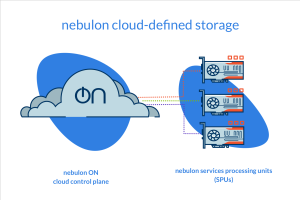Nebulon emerges from stealth and unveils cloud-defined Storage

Nebulon, Inc. announced today Cloud-Defined Storage, on-premises, server-based storage for mission critical applications managed by the Nebulon cloud. Cloud-Defined Storage is powered by the combination of a secure, cloud-based control plane and PCIe cards that are installed into customers’ servers, providing the necessary enterprise-class data services for critical applications.
With Cloud-Defined Storage, customers can cost-effectively and simply address both modern workloads like containers and NoSQL databases as well as traditional workloads like VMware and clustered SQL databases, whilst eliminating the operational overhead of managing and automating storage operations at-scale. Cloud-Defined Storage is the first ground-breaking innovation for server-based primary storage since the introduction of hyperconverged infrastructure.
Hybrid IT organisations pursuing cloud operating models must address a growing class of mission critical data that cannot or should not move to the public cloud due to service level, cost or compliance reasons. Although this data must remain on premise, CIO’s are looking for innovative technologies that enable a self-service approach to provisioning and maintaining infrastructure for their application owners much like is possible with the public cloud today.
Cloud-Defined Storage provides the application owner a path not just to self-service enterprise-class storage, but self-service infrastructure over time. And by enabling self-service to other parts of the organisation, Cloud-Defined Storage provides infrastructure managers a way to reduce time spent provisioning and administering specialised storage assets and instead increase the time dedicated to software development and other high ROI projects.

Cloud-Defined Storage provides all essential enterprise-class data services such as compression, encryption, deduplication, erasure coding, snapshots and data mirroring from the Nebulon Services Processing Unit (SPU). The SPU is a PCIe-based storage engine installed inside the customer’s application server, where it is attached to the internal server SSDs much like a RAID card.
This cloud-managed, server-based approach for mission-critical storage reduces cost by leveraging commodity SSDs in industry standard servers. This solution also supports any server operating system or hypervisor and requires no software on the server, thereby avoiding stealing CPU and memory resources from customers’ applications.
Cloud-Defined Storage automates storage operations and delivers infrastructure and application insights through a secure, cloud-based control plane called Nebulon ON. The Nebulon SPU transmit tens of thousands of storage, server and application metrics per hour to Nebulon ON for AI-based analysis. Cloud-Defined Storage is the first storage model that combines the management console and its associated metrics—which have typically been siloed on-premises—with AI analytics data into one view.
This approach means IT managers and application owners can take advantage of capabilities previously not available for on-premise enterprise storage deployments, such as fleet management, automated software updates, predictive maintenance and faster troubleshooting. This zero-touch remote administration and monitoring is especially powerful in times of social distancing, as IT managers can easily perform their duties from home offices.
“Organisations are increasingly demanding a more cloud-like experience for their most critical on-premises applications,” said Siamak Nazari, co-founder and CEO of Nebulon. “Cloud-Defined Storage delivers global insights, ai-based administration and API-driven automation making enterprise-class storage a simple attribute of the datacentre fabric with self-service infrastructure provisioning and storage operations as-a-service for application owners.”
Customers will be able to purchase Cloud-Defined Storage directly through datacentre infrastructure vendors including Hewlett Packard Enterprise (HPE) and Supermicro.

Siamak Nazari
“HPE ProLiant servers deliver a secure, high-performing foundation for enterprises to optimise innovative storage capabilities across growing hybrid IT environments,” said Neil MacDonald, senior vice president and general manager, Compute at HPE “By combining HPE ProLiant Servers with Nebulon’s Cloud-Defined Storage, we are enabling customers to expand their hybrid IT solutions and further automate storage operations.”
“Supermicro is a provider of high-performance, high-efficiency server technology innovation with the most optimised selection for IT, datacentre and HPC environments,” said Eric Sindelar, GM of Operations and Advanced Technology Development at Supermicro. “Nebulon’s Cloud-Defined Storage technology leverages Supermicro’s Ultra systems to create an exciting new server-based storage solution, and we are excited to work with Nebulon and others to support customers for enterprise-class storage deployments.”
Comment on this article below or via Twitter @IoTGN
